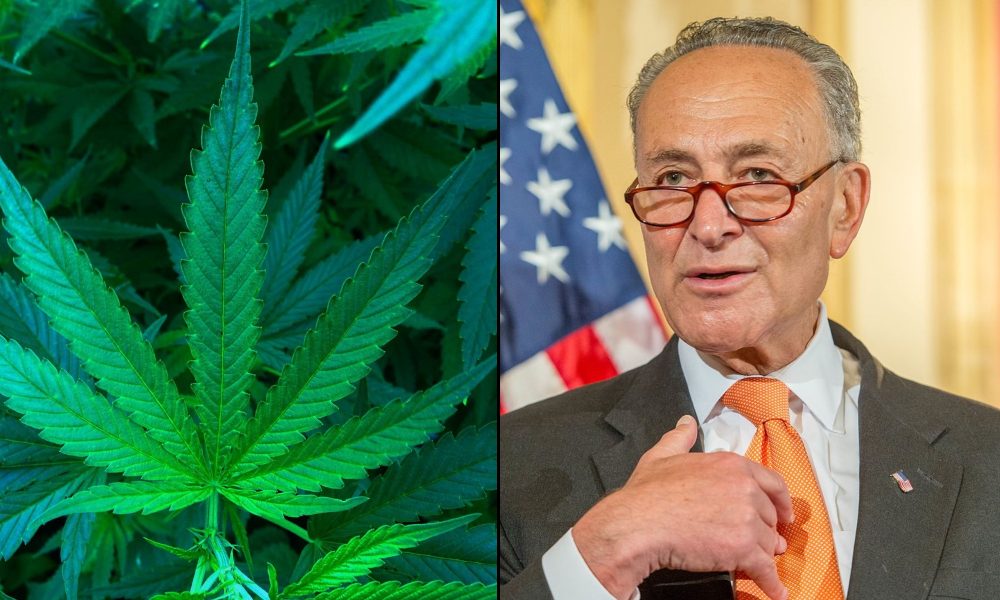A top staffer for Senate Majority Leader Chuck Schumer (D-NY) spoke on Thursday about the path forward for a federal marijuana legalization bill and the prospects of passing incremental measures like cannabis banking reform in the interim.
At an event hosted by the Council for Federal Cannabis Regulation (CFCR), Schumer’s chief counsel Reginald Babin said that “there is a bit more work to be done in terms of figuring out where the sweet spot is at least in the Senate in terms of what we can do this year.”
He said that finding that balance is “work that we are currently undertaking” on the Senate side. While a draft version of the his boss’s Cannabis Administration & Opportunity Act (CAOA) was unveiled last summer, Babin said that final legislative text will “hopefully” be filed in the “near future” as they “perfect that framework.”
TODAY’S WEBINAR: ‘Providing a Safe and Legal Pathway for Medical Cannabis Use in the U.S.’ Thurs. Apr. 28 1-2 EST. Conversation will center around the pros and cons of medical use cannabis w/ a focus on the latest research. Free to attend, register: https://t.co/BtxYn3KG9E pic.twitter.com/VaUyFjk31j
— Council for Federal Cannabis Regulation (@uscfcr) April 28, 2022
The Senate leader said last week that he was making a “promise” to formally introduce a comprehensive legalization bill before the August recess, even though he previously said it would be filed this month.
Schumer and colleagues have been working on the cannabis reform bill for over a year, and there’s been some frustration among advocates and stakeholders over the protracted timeline for its formal introduction, which Schumer said in recent months would happen in April before putting out a statement walking that back.
Schumer, Senate Finance Committee Chairman Ron Wyden (D-OR) and Sen. Cory Booker (D-NJ) are leading the effort on CAOA. But while advocates are eager for an end to prohibition, the senators have faced criticism over preventing more modest reform with stronger bipartisan support from advancing as an interim step.
Babin was pressed at Thursday’s event about when the time would be right to allow incremental reform to advance.
“I would say it makes sense when it makes sense,” he said, adding that “legislating is not a thing [where] you can identify a time on the calendar where it makes the most sense to do something. It’s a never-ending process…but we are in constant conversation on number of issues.”
“We are having a number of conversations with a number of different paths forward and ultimately choosing the path that makes the most sense that helps the most people in the immediate,” he said.
The question was about the broader debate over incremental versus comprehensive reform, but that conversation is especially pertinent to the bipartisan Secure and Fair Enforcement (SAFE) Banking Act, which has passed the House in some form six times now only to stall in the Senate under both Democratic and Republican control.
The measure from Rep. Ed Perlmutter (D-CO) most recently advanced through the chamber as part of a large-scale manufacturing bill, but it was not included in the Senate version. Now as the legislation heads to bicameral conference, leadership is facing pressure on multiple fronts to put the reform back in and get it to the president’s desk.
Babin said that the America COMPETES Act will have “significant ramifications across a number of sectors” and that there are “a number of moving parts that probably exceed my capacity to articulate.”
“We have to account for all those moving parts,” the Schumer aide said.
While it’s “important” that congressional leaders like House Speaker Nancy Pelosi (D-CA) and Sen. Patty Murray (D-WA), the third-ranking-Democrat in the Senate, have made a point to push for SAFE Banking in the broader legislation, Babin said that it’s “equally important” to account for the fact that Senate Minority Leader Mitch McConnell (R-KY) has zeroed in on the banking provision as a prime example of a policy he would resist being attached to broad legislation.
“It’s too early to tell what the outcome is going to be given all the myriad factors that are going to come into play from now until whenever that bill hopefully is reported out of conference and voted on in the Senate,” he said.
A staffer for Rep. Dave Joyce (R-OH), a co-chair of the Congressional Cannabis Caucus, also participated in Thursday’s event, and said that she’s “personally optimistic” that SAFE Banking does have a path forward as negotiators head to conference on the broader manufacturing bill.
Amanda Kain, Joyce’s deputy chief of staff and policy director, stressed that the cannabis banking legislation enjoys “broad and bipartisan support.”
“At the end of the day, what we’re all trying to do here is get as much done as possible. And so I do think that will still be the state of play in both chambers,” with respect to SAFE Banking, Kain said. “We’re all trying to get as much done as possible without completely unwinding the whole strategy.”
The aide added that Joyce’s office is “very committed to getting it done.”
The congressman does back ending federal marijuana prohibition as well, but he’s departed from his Cannabis Caucus co-chairs on exactly what a regulatory framework should look like, voting against a House legalization bill at the beginning of this month that ultimately cleared the chamber along mostly partisan lines, for example.
“I think one of the things that is necessary to make sweeping reform possible, at least in our chamber, is a regulatory model,” Kain said. And to that end, she commended Schumer’s team for “going through exhaustive lengths to identify what that is” as part of his forthcoming bill.
“I can’t say whether or not we endorse it because I don’t know what’s in it—but in the House, we unfortunately voted on a piece of legislation that did not include regulations. And that was a nonstarter for a lot of members, including my own,” she said.
The deputy chief said that part of the problem on the House side when it comes to passing legalization is that, she said, there isn’t sufficient communication or enough hearings to determine what an effectively regulatory structure should look like.
That’s part of the reason that Joyce recently filed a bipartisan bill with Reps. Hakeem Jeffries (D-NY) and Brian Mast (R-FL) to simply direct the attorney general to create a commission charged with making recommendations on a regulatory system for marijuana that models what’s currently in place for alcohol.
The lack of constructive communication, both internally within the chamber and with outside agencies has contributed to some of the “misinformation” around the benefits of medical cannabis as well, Kain said.
Schumer’s staffer agreed that misinformation, partly caused by existing restrictions on marijuana research, is “a huge piece” of the problem.
“Putting in place proposed frameworks that can then serve as the basis for conversations and negotiations, I think, is one of the things that will allow us to work through some of those impediments,” Babin said.
Kain said that “there’s a lot of work to be done on the Republican side of the aisle” and the “grassroots popularity of this issue hasn’t trickled up to the federal level.” One way to bridge that divide, she said, is to highlight the personal stories of people who’ve been impacted by prohibition or benefitted from cannabis.
“If you humanize the issue, you’re more likely to win hearts and minds,” she said.
The staffer also mentioned the fact that 75 Republican members of the House voted against a bipartisan marijuana research bill this month that’s meant to streamline studies into cannabis, in part by allowing scientists to access products from state-legal dispensaries.
“I have a lot of theories about why that is” that so many GOP members voted against the measure, she said, without elaborating. “They’re voting against epilepsy research, they’re voting against MS therapies, they’re voting against opioid alternatives.”
“There’s definitely some pressure that needs to be put on the agencies, but there’s also pressure that needs to be put on the members and the senators who are still opposed to this concept on a medicinal basis,” Kain said.
When it comes to the CAOA, the Senate sponsors have said that the newly extended timeline is necessary, enabling them to spend more time refining the bill’s provisions with feedback from the public and bipartisan lawmakers that could help them overcome a steep vote threshold for passage in the chamber. Democrats hold just a slim majority in the Senate, and not everyone in the party is on board with legalization.
At this point, some advocates and stakeholders have become skeptical about Senate leaders’ follow-through on cannabis, especially when it comes to the timeline. Schumer had made prior commitments to bring legalization to the floor—not just for CAOA but also for his earlier reform bill, the Marijuana Freedom and Opportunity Act. It’s not yet clear if he still intends to hold a vote on the new legislation after it is introduced, even if it doesn’t have enough support to pass.
In a floor speech on the unofficial marijuana holiday 4/20 last year, he said he wanted to see the legalization proposal advance to a floor vote and go to the president’s desk by this 4/20.
But things haven’t panned out exactly as planned, and the leader emphasized that there are about a dozen committees reviewing and making recommendations for the proposal as it continues to be finalized.
On Thursday, Babin said that Schumer is “committed to advancing federal legalization that [supports] communities that have been most directly impacted by prohibition and all of its intended effects—and we think that those impacts have been significant enough for a long enough time that it’s worth taking some time” to ensure that the legislation will be effective.
“I understand that the legislative process can be frustrating as a starting point,” the Schumer aide said. “We respect people who feel as though more should have happened by now—I disagree with that, but I respect everyone’s opinion and their right to have their opinion—but from day one and throughout this process he’s been consistent that he would always stand for those communities and find a way to try to address those harms if possible.”
Meanwhile, several Republican members of Congress introduced a bill last November to federally legalize and tax marijuana as an alternative to far-reaching Democratic-led reform proposals and scaled-down GOP cannabis descheduling legislation. The sponsor of that bill, Rep. Nancy Mace (R-SC), said she expects a committee hearing on her proposal.
Medical Disclaimer:
The information provided in these blog posts is intended for general informational and educational purposes only. It is not a substitute for professional medical advice, diagnosis, or treatment. Always seek the advice of your physician or other qualified healthcare provider with any questions you may have regarding a medical condition. The use of any information provided in these blog posts is solely at your own risk. The authors and the website do not recommend or endorse any specific products, treatments, or procedures mentioned. Reliance on any information in these blog posts is solely at your own discretion.







